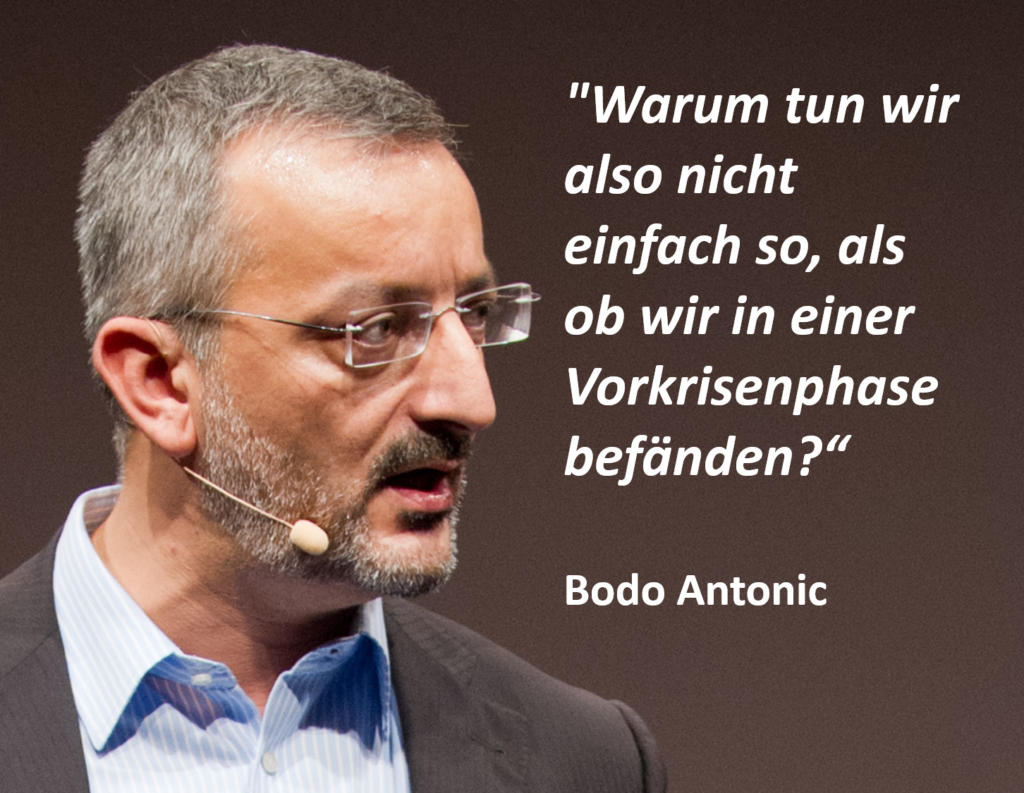
We as human beings have an extraordinary ability: we can repress. And we can hope. This is a wonderful feature, as it puts us in a position to barricade the windows and declare a state of emergency at every light breeze. However, this ability also has its dark side. Turning one’s eyes to, hoping for, and perpetuating, in some cases, becomes a reckless thing that can rob enterprises of their survivability and employees’ jobs. This is reinforced by a latent in the society machismo, who paid homage to the (over) brave and laughed at the cautious.
If I go into personal conversation with my clients, my colleagues and employees, however, a phenomenon can be observed very quickly, if one scratches only a little at the superficial varnish. Only 2 or 3 questions are enough to make some of my interviewees, whether they be employees or business leaders, brood and lose their emotional pants. From a broad-brimmed tone of conviction is quickly a tight-lipped hesitation and the question of whether I would now see the crisis come, all of which begin to whisper behind closed doors.
Well, I do not have a crystal ball and very much doubt that it exists. And I doubt we need them at all. Behind closed doors, many people whisper of crisis. First intoxication in the form of falling indices also announce the oncoming fire. Burning smell can clearly be heard, but we are still hesitant to accept it. Luxury surrogate problems dominate the scenery, preventing us from sometimes focusing on what is really necessary.
Nor is a globally relevant political leader on the horizon. But on the contrary. The disgusting gentlemen from Washington, London, Warsaw, Budapest, Sao Paolo and Tehran give us a picture that can be called irritating at best. Let us show them the red card! So when there is a no inspiration for hope by the leaders, when the first clouds of smoke in the crisis will irritate our senses and valued colleagues will express themselves clearly – what keeps us from starting with an emerging, veritable crisis?

This would have a wonderful advantage. Are we going out of a crisis for the moment – not life threatening! – then we could sit down in peace (Stop-Think-Act) and be prepared for tomorrow. We could again – calmly – consider whether, in what form and to what extent the crisis would hit us. There are many forms and qualities of crisis. It makes a difference whether in the Croatian Adriatic a Maestral or a Bora comes along, whether I am in the northern or southern slipstream of an island and in what condition my sailing crew is. No different in the company: Are my employees, my colleagues or my superiors bad weather-proof or do they only know to sail at nice and tiny lakes at 2 beaufort? Am I export dependent or is domestic demand sufficient?
All these questions must be thought through in a hard think. It is important to anticipate and – sail speaking – to clear the ship and prepare for the storm. If the bad weather is forgiven and all the preparations have proved unnecessary, it still does not represent an unnecessarily consumed life energy. Every sailor knows how wonderful a tidy ship pleases the eye and the heart; every entrepreneur and manager knows how much less ballast a tidy company has to lug around with them and thus to achieve a significant increase in speed and performance.
Thinking through these points in a hard think does not mean that you can plenty time to waste. We do not have to dishonor prudence, but it also requires a certain amount of Äktschn. And a clearly structured viewing scheme. Otherwise, you will end up in hours and days, little structured duration meetings, which ultimately only reinforce the feeling that you would have achieved anything and not feel sufficiently prepared for the crisis.
If you do not have this grid at hand, you will eventually do little or nothing and remain tetanic until the wave collapses over you.
Dies gilt es zu verhindern. Rechtzeitig. Nicht panikartige Kosten- und Mitarbeiterreduktionsprogramme sind das Gebot der Stunde. Es gilt Ballast über Bord zu werfen. In Einzelfällen mag dies auch den ein oder anderen Menschen treffen, aber zuvor haben wir ein Riesenbouquet an Möglichkeiten, die es zu nutzen gilt.
Ich bin Vertriebler, Verkäufer mit Herzblut und Verstand. Daher will ich mich auf das konzentrieren, wovon ich etwas verstehe. Hier kann ich Wucht und Wirkung für meine Mandanten, für die Unternehmen, die ich unterstütze, entfalten. Lassen Sie mich daher in den nächsten Wochen einen Blick auf den Vertrieb als Schlüsselerfolgsfaktor in der Krise werfen.
Thematischer Ausblick: Was sind die Schlüsselerfolgsfaktoren des Vertriebs in der Krise?
- Vertriebsmitarbeiter
- Kunden
- Produkte
- Prozesse
- Schnittstellen
- Unternehmenssprache
- Spielregeln
Das Ziel dieser Artikelserie wird es sein komme ihnen die notwendigen Analysetools an die Hand zu geben, die sie brauchen, um den aktuellen Status quo in ihrem Unternehmen zu beleuchten. Darüber hinaus werde ich anhand von Praxisbeispielen verdeutlichen, wie nach meinem Dafürhalten eine Lösung beziehungsweise Umsetzung exemplarisch aussehen könnte.


